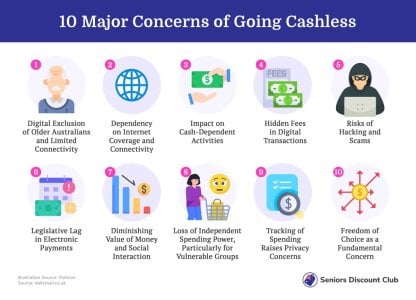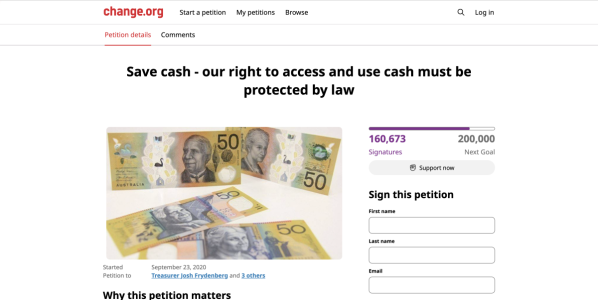10 major concerns emerging as Australia shifts towards digital transactions
By
Seia Ibanez
- Replies 16
As Australia witnesses a rapid shift towards a cashless society, concerns are mounting.
This situation has been accelerated by the COVID-19 pandemic, with digital wallet payments on smartphones and watches soaring from $746 million in 2018 to more than $93 billion in 2022.
By the end of 2022, cash accounted for only 13 per cent of Australian consumer payments, compared to 70 per cent in 2007.
'The shift towards a cashless society in Australia isn't just a possibility, it's already well underway,' RMIT Associate Professor in Finance Angel Zhong said.
Dr Zhong thought that while paper money won't disappear completely, it will become much less common in daily transactions.
‘The functionally cashless society is where we enjoy the convenience of technology - we don't have to go out with a bunch of cash, we can use our phone and smartwatch to make payments,’ she said.
As more Australians join the trend, many shops only take digital payments.
Big banks are shutting down branches, reducing ATMs, and even opening branches without cash, saying people prefer online services.
However, moving to electronic payments brings risks and might not benefit everyone.
Here are the ten major concerns of going cashless:
1. Digital Exclusion of Older Australians and Limited Connectivity
Dr Zhong noted that Australians aged 18 to 29 are the main users of digital payments.
'Two-thirds of them use digital wallets,' she said.
However, older Australians prefer physical currency, with almost one in five classified as a ‘high-cash user’. Those who have lower incomes and new migrants also relied more on cash.
This led Dr Zhong to call for ‘better support for other age groups to embrace technology, better literacy about systems in technology as well as financial assistance’ for those struggling with the transition to digital payments.
2. Dependency on Internet Coverage and Connectivity
Digital transactions rely on internet coverage, posing challenges in rural areas with slow internet.
Even in urban areas, a major Commonwealth Bank outage highlighted the vulnerability of digital finance.
Dr Zhong urged government support for infrastructure investments to enhance internet coverage and speeds.
3. Impact on Cash-Dependent Activities
Charity donations given on the streets are dwindling as fewer people carry cash, based on research done in 2020.
'While retailers and online merchants have benefited from cashless payment options, donation-seekers are left rattling an empty cup,' University of Massachusetts' Spencer M. Ross and Auckland University of Technology's Sommer Kapitan wrote.
'Aside from people carrying less cash, our research suggests another major reason is that people simply don't expect to see beggars or buskers with a swipe machine, or a QR code or Venmo symbol on their signs.'
4. Hidden Fees in Digital Transactions
When you use digital transactions, you may have to pay a fee, which might not be clear when you make the purchase.
Warwick Ponder, who used to work at eftpos Payments Australia, said Paywave devices sometimes add an extra charge later.
He suggested not using Tap too much because it can take a while for the money to show up in your account.
Also, banks usually charge more for 'tap-and-go' than for EFTPOS, and cash doesn't have any extra cost.
5. Risks of Hacking and Scams
In 2021, Australians are estimated to have lost over $2 billion to online scams, but the true figure could be much higher due to many incidents going unreported.
Nigel Phair, the Director of UNSW Institute for Cyber-Security, emphasised the need for stronger efforts against cyber-crime, stating, ‘The Australian Cyber-Security Centre said they had about 63,000 reports (of scams) last year, I reckon that's about a fifth of what the actual number is.’
He further expressed scepticism about the reported losses.
‘The ACCC had about $2 billion in reported losses from scams. I reckon that's nowhere near the right amount,’ he added.
6. Legislative Lag in Electronic Payments
The rules for electronic payments are often slow to catch up with new technology and changes in the market.
Currently, Google Pay and Apple Pay don't have to follow the same rules as credit cards and EFTPOS transactions.
Treasurer Jim Chalmers is working on updating the laws to fix this.
Dr Zhong pointed out, ‘That Payments Act is actually out of date.’
‘We need to regulate to ensure that we have an industry-wide standard to ensure that consumers' well-being and security are protected.’
7. Diminishing Value of Money and Social Interaction
According to Finance Commentator Sarah Wells, if all transactions become digital, children will lose out on understanding the real worth of money and important social experiences.
I believe it is better for children to use cash,’ Well said.
‘Giving a child $20 and taking them to a shopping centre or the movies helps them to learn to budget and helps them to make decisions by thinking more carefully.’
‘There's a responsibility in handing over money and such valuable social interaction—they learn to say 'please' and 'thank you' and look people in the eye.’
8. Loss of Independent Spending Power, Particularly for Vulnerable Groups
Wells also warned that having 'a cash-starved society' could be bad news for those whose finances are being controlled or denied by someone else.
She said young women who were fleeing domestic violence needed to be kept in mind when regulating digital payments.
Women in these circumstances risk being tracked by an abusive partner or being cut off from their finances.
'We need to make sure we are not compromising the safety, education, and experience of minority groups and young minds in our endeavours to legislate contemporary payment platforms,' she said.
9. Tracking of Spending Raises Privacy Concerns
The concern about losing anonymity and privacy is significant for many who are against a 'cashless society.'
Elizabeth Hynton created a change.org petition opposing the 'discrimination' faced by cash users, gathering over 5000 signatures.
The petition argues, 'Cash is private.'
'When one pays via credit/debit card, the Government knows: what one spends their money on, how much they spend, where one spends their money and when the purchase was made, which is an invasion of privacy.'
Dr Zhong concurred that these concerns are valid, saying, '(With) anything digital there is always a vulnerability it will be tracked.'
10. Freedom of Choice as a Fundamental Concern
This is the main concern for many who are against the idea of a cashless society.
The change.org petition insists that cash should always be a choice.
It states, 'One of the hallmarks of a free society is freedom of choice...not just what suits an organisation, but also what suits the customer!'
'We can't go on forever using COVID as an excuse.'
China illustrates a worrying scenario of control, where people are assigned a social credit score based on their behaviour according to the government.
A low social credit score can lead to restrictions, like being blocked from buying plane or train tickets.
The Reserve Bank is currently exploring the benefits of introducing a central bank digital currency (CBDC) to Australia, similar to China's 'programmable' currency.
While acknowledging potential improvements in the' efficiency and resilience’ of payments, the RBA stated that a CBDC is not likely to be introduced anytime soon, citing unresolved issues that could take several years to address.
'Given the many issues that are yet to be resolved, any decision on a CBDC in Australia is likely to be some years away,' the RBA said.
Here’s the summarised list of the 10 major concerns of going cashless:

 Have you experienced difficulty accessing cash? Share your experiences and join the conversation below.
Have you experienced difficulty accessing cash? Share your experiences and join the conversation below.
This situation has been accelerated by the COVID-19 pandemic, with digital wallet payments on smartphones and watches soaring from $746 million in 2018 to more than $93 billion in 2022.
By the end of 2022, cash accounted for only 13 per cent of Australian consumer payments, compared to 70 per cent in 2007.
'The shift towards a cashless society in Australia isn't just a possibility, it's already well underway,' RMIT Associate Professor in Finance Angel Zhong said.
Dr Zhong thought that while paper money won't disappear completely, it will become much less common in daily transactions.
‘The functionally cashless society is where we enjoy the convenience of technology - we don't have to go out with a bunch of cash, we can use our phone and smartwatch to make payments,’ she said.
As more Australians join the trend, many shops only take digital payments.
Big banks are shutting down branches, reducing ATMs, and even opening branches without cash, saying people prefer online services.
However, moving to electronic payments brings risks and might not benefit everyone.
Here are the ten major concerns of going cashless:
1. Digital Exclusion of Older Australians and Limited Connectivity
Dr Zhong noted that Australians aged 18 to 29 are the main users of digital payments.
'Two-thirds of them use digital wallets,' she said.
However, older Australians prefer physical currency, with almost one in five classified as a ‘high-cash user’. Those who have lower incomes and new migrants also relied more on cash.
This led Dr Zhong to call for ‘better support for other age groups to embrace technology, better literacy about systems in technology as well as financial assistance’ for those struggling with the transition to digital payments.
2. Dependency on Internet Coverage and Connectivity
Digital transactions rely on internet coverage, posing challenges in rural areas with slow internet.
Even in urban areas, a major Commonwealth Bank outage highlighted the vulnerability of digital finance.
Dr Zhong urged government support for infrastructure investments to enhance internet coverage and speeds.
3. Impact on Cash-Dependent Activities
Charity donations given on the streets are dwindling as fewer people carry cash, based on research done in 2020.
'While retailers and online merchants have benefited from cashless payment options, donation-seekers are left rattling an empty cup,' University of Massachusetts' Spencer M. Ross and Auckland University of Technology's Sommer Kapitan wrote.
'Aside from people carrying less cash, our research suggests another major reason is that people simply don't expect to see beggars or buskers with a swipe machine, or a QR code or Venmo symbol on their signs.'
4. Hidden Fees in Digital Transactions
When you use digital transactions, you may have to pay a fee, which might not be clear when you make the purchase.
Warwick Ponder, who used to work at eftpos Payments Australia, said Paywave devices sometimes add an extra charge later.
He suggested not using Tap too much because it can take a while for the money to show up in your account.
Also, banks usually charge more for 'tap-and-go' than for EFTPOS, and cash doesn't have any extra cost.
5. Risks of Hacking and Scams
In 2021, Australians are estimated to have lost over $2 billion to online scams, but the true figure could be much higher due to many incidents going unreported.
Nigel Phair, the Director of UNSW Institute for Cyber-Security, emphasised the need for stronger efforts against cyber-crime, stating, ‘The Australian Cyber-Security Centre said they had about 63,000 reports (of scams) last year, I reckon that's about a fifth of what the actual number is.’
He further expressed scepticism about the reported losses.
‘The ACCC had about $2 billion in reported losses from scams. I reckon that's nowhere near the right amount,’ he added.
6. Legislative Lag in Electronic Payments
The rules for electronic payments are often slow to catch up with new technology and changes in the market.
Currently, Google Pay and Apple Pay don't have to follow the same rules as credit cards and EFTPOS transactions.
Treasurer Jim Chalmers is working on updating the laws to fix this.
Dr Zhong pointed out, ‘That Payments Act is actually out of date.’
‘We need to regulate to ensure that we have an industry-wide standard to ensure that consumers' well-being and security are protected.’
7. Diminishing Value of Money and Social Interaction
According to Finance Commentator Sarah Wells, if all transactions become digital, children will lose out on understanding the real worth of money and important social experiences.
I believe it is better for children to use cash,’ Well said.
‘Giving a child $20 and taking them to a shopping centre or the movies helps them to learn to budget and helps them to make decisions by thinking more carefully.’
‘There's a responsibility in handing over money and such valuable social interaction—they learn to say 'please' and 'thank you' and look people in the eye.’
8. Loss of Independent Spending Power, Particularly for Vulnerable Groups
Wells also warned that having 'a cash-starved society' could be bad news for those whose finances are being controlled or denied by someone else.
She said young women who were fleeing domestic violence needed to be kept in mind when regulating digital payments.
Women in these circumstances risk being tracked by an abusive partner or being cut off from their finances.
'We need to make sure we are not compromising the safety, education, and experience of minority groups and young minds in our endeavours to legislate contemporary payment platforms,' she said.
9. Tracking of Spending Raises Privacy Concerns
The concern about losing anonymity and privacy is significant for many who are against a 'cashless society.'
Elizabeth Hynton created a change.org petition opposing the 'discrimination' faced by cash users, gathering over 5000 signatures.
The petition argues, 'Cash is private.'
'When one pays via credit/debit card, the Government knows: what one spends their money on, how much they spend, where one spends their money and when the purchase was made, which is an invasion of privacy.'
Dr Zhong concurred that these concerns are valid, saying, '(With) anything digital there is always a vulnerability it will be tracked.'
10. Freedom of Choice as a Fundamental Concern
This is the main concern for many who are against the idea of a cashless society.
The change.org petition insists that cash should always be a choice.
It states, 'One of the hallmarks of a free society is freedom of choice...not just what suits an organisation, but also what suits the customer!'
'We can't go on forever using COVID as an excuse.'
China illustrates a worrying scenario of control, where people are assigned a social credit score based on their behaviour according to the government.
A low social credit score can lead to restrictions, like being blocked from buying plane or train tickets.
The Reserve Bank is currently exploring the benefits of introducing a central bank digital currency (CBDC) to Australia, similar to China's 'programmable' currency.
While acknowledging potential improvements in the' efficiency and resilience’ of payments, the RBA stated that a CBDC is not likely to be introduced anytime soon, citing unresolved issues that could take several years to address.
'Given the many issues that are yet to be resolved, any decision on a CBDC in Australia is likely to be some years away,' the RBA said.
Here’s the summarised list of the 10 major concerns of going cashless:

Key Takeaways
- The COVID-19 pandemic has accelerated Australia's move towards a cashless society, with digital wallet payments skyrocketing from $746 million in 2018 to over $93 billion in 2022.
- Resistance to a cashless society is mounting due to concerns such as the exclusion of certain population groups, hidden fees, cybersecurity risks, and loss of privacy, despite an ongoing trend towards digital transactions.
- Critics argue for better support, improved internet infrastructure, regulatory updates, and consideration for the potential social and economic implications of a cashless society.









